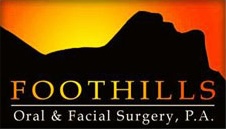Surgery of any kind places stress on your body. Get adequate rest and avoid strenuous activity for a few days following your procedure. It is important for someone to stay with you until you have recovered from the effects of these medications. Swelling, discomfort, and restricted jaw function are expected, and so they need not cause alarm. These may be minimized by the following instructions:. Please read them carefully; it is strongly urged that they be followed.
Bleeding
Apply constant pressure on the gauze over the surgical site. This acts as a pressure dressing to control any active bleeding. If bleeding is excessive, place a roll of gauze or a moistened tea bag over the surgical site and bite firmly for 45 minutes with constant pressure. Repeat if necessary. Avoid rinsing, spitting, smoking, and drinking through a straw, as this will disturb the blood clot and reinitiate bleeding. Assume a semi-upright position; use two pillows in bed. If significant bleeding still continues, call the office for advice.
Swelling
Swelling and bruising are normal reactions to surgery and vary from patient to patient. Swelling reaches its peak about 48–72 hours after surgery. It is not unusual to have difficulty opening the mouth due to post-operative swelling in the muscles. This should resolve on its own with time. Applying moist heat 4-6 times per day to the surgical sites beginning 24 hours after surgery increases blood circulation and helps take away swelling. Bruising will resolve on its own, but it may take up to a week or more.
Infection
Most surgical procedures in healthy patients have a low risk of developing an infection. Some patients may be placed on antibiotic medication. It is important to follow the directions on the label and take the medication until it is completely gone. If you develop hives or a rash, discontinue all medication and contact the office immediately. There may be a slight elevation in temperature the first 24-48 hours after surgery; this is the body’s normal response to the surgery. If the temperature persists or is greatly elevated, please notify the office.
Pain
After any surgical procedure, swelling and some discomfort are anticipated. This normally reaches its peak 48-72 hours after surgery, and then begins to decrease. If you only have minor pain, try over-the-counter drugs, such as Tylenol, Advil, or Aleve. If you have a prescription for a stronger pain medication, have it filled at the pharmacy and take the medication as directed. Pain medication should never be taken on an empty stomach. If you develop hives or a rash, discontinue all medication and contact the office immediately.
Nausea
Post-operative nausea is usually due to swallowing a small amount of blood during and/or after surgery. A small amount of carbonated drink, such as Sprite or Ginger Ale, every hour for 5–6 hours will usually relieve this feeling. Sometimes pain medications can cause nausea, especially when taken on an empty stomach. If nausea continues, contact the office.
Diet
A bland liquid diet is recommended for the day of surgery. Following this, soft foods high in protein and vitamins are recommended. Avoid crunchy foods, which may irritate the surgical site. Resume your normal diet as soon as possible.
Oral Hygiene
Do not rinse your mouth for the first 12 hours following surgery; this would loosen the blood clots and reinitiate bleeding. The day following surgery, the mouth should be rinsed with warm salt water 5–6 times a day after meals and at bedtime. Do not use any type of mouthwash, such as Listerine, Crest, Scope, etc. If you were given an irrigating syringe, use it to gently flush out the extraction sites with warm salt water 3–4 times per day, starting 5 days after surgery. You may brush your teeth beginning the day after surgery.
Smoking
Smoking is a great irritation to the surgical site. Smoking should be avoided or greatly reduced during the healing period.
Sutures
Sutures may have been used to close the surgical wound; they are the type that will dissolve. They will begin to come out in 5-7 days.
Should you have any post-operative problems or questions, do not hesitate to call the office so we may help.






